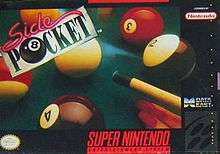Side Pocket
| Side Pocket | |
|---|---|
 Arcade flyer | |
| Developer(s) | Data East; Iguana Entertainment (SNES) |
| Publisher(s) | G-Mode |
| Composer(s) | K. Suzuki (NES version), Rick Fox (SNES version) |
| Platform(s) | Arcade, Mega Drive/Genesis, NES/Famicom, SNES, Game Boy, Game Gear, WonderSwan, 3DS Virtual Console |
| Release date(s) |
Arcade
NES/Famicom Game Boy SNES 3DS Virtual Console (Game Boy) |
| Genre(s) | Cue sports |
| Mode(s) | Single-player, multiplayer |
Side Pocket (Japanese: サイドポケット Hepburn: Saido Poketto) is a pocket billiards video game originally released into arcades by Data East in 1986. The arcade version was eventually ported to six home console platforms and two sequels to the game were produced, as well as a spin-off series called Pocket Gal. G-Mode currently owns the intellectual property rights to the Side Pocket series, and licenses these games globally.
Gameplay

The primary play mode, called "pocket game", requires that the player clear all the balls off the table in a limited number of shots, as well as achieve a predetermined score. The player earns points by sinking balls, sinking balls on consecutive shots, and sinking balls in numerical order. On occasion, a pocket will light up, and if the player sinks a ball into that pocket on that shot, a bonus will be earned in the form of points or extra shots. In the two-player "pocket game" mode, the game plays similarly, except the two players take turns; if one player does not pocket a ball or scratches, control of the ball changes to the other player.
There is also a two-player nine-ball mode.
A variety of trick shot challenges are also available to the player(s), to earn additional points or extra shots, requiring the player sink all balls into select pockets using a single shot. The player may put various spins on the ball, such as left and right english, and perform massés and jump shots.

Reception
In reviewing the NES version, Computer Gaming World declared it "far and away the best billiards simulation ever published for any system". The features that went beyond realistic pool were especially praised as enhancing the game's play.[2]
Reviewing the SNES version, GamePro praised the variety of modes, the audio and graphical improvements over the NES version, and the realistic details. They recommended the game "for pool enthusiasts and casual video game pool players alike. There are plenty of great options and genuine pool strategies to keep serious players interested, and yet it's simple enough to play without the manual."[3] They gave the Game Gear version a more mixed review, commenting that the representation of the player's stick as a stream of balls is needlessly cumbersome, and that the graphics and sound are poor. However, they summarized, "Determining the precise angle and power for a shot can be harder than taking a geometry test, but it's definitely more fun."[4] Electronic Gaming Monthly also complained of poor sounds but were more impressed with the graphics, describing them as exceptional for a portable system. They praised the game for its trick shots and generally strategic gameplay and gave it a 6.25 out of 10.[5]
References
- ↑ "Side Pocket trademark.". U.S. Patent & Trademark Office. 1988-07-05. Retrieved 2015-05-31.
- ↑ Kunkell, Bill (July 1988), "Video Gaming World: Side Pocket", Computer Gaming World, p. 45
- ↑ "ProReview: Side Pocket". GamePro (55) (IDG). February 1994. p. 121.
- ↑ "Side Pocket". GamePro (60) (IDG). July 1994. p. 134.
- ↑ "Review Crew: Side Pocket". Electronic Gaming Monthly (59) (EGM Media, LLC). June 1994. p. 40.
External links
- Official G-Mode webpage of the Side Pocket series
- Side Pocket at Killer List of Videogames
- Side Pocket at MobyGames
| ||||||||||